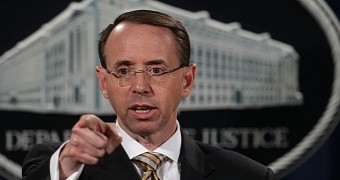As detailed by Deputy Attorney General Rod Rosenstein's remarks during Interpol's 87th General Assembly speech, both cryptocurrency and communication encryption are on the U.S. Department of Justice's current agenda.
"We must not allow cybercriminals to hide behind cryptocurrencies. Virtual currencies have some legitimate uses. But bad actors are using them to fund crimes and to hide illicit proceeds," said Rosenstein.
Furthermore, "For example, Bitcoin was the exclusive method of payment for the WannaCry ransomware attack that spread around the globe, causing billions of dollars in losses."
Besides the obvious benefit of using a crypto coin to hide money obtained through illegal means from law enforcement agencies, Rosenstein also mentioned the fact that adversaries can also use cryptocurrencies in elaborate scams to trick investors and manipulate markets to their benefit.
The DOJ Deputy Attorney General urged all other law enforcement representatives present to promote the inclusion of virtual currencies into their respective countries anti-money laundering regulations just as they are in the U.S.
Encrypted communications are seen as a barrier toward free access to criminal evidence
"We also need to protect against abuses of encrypted communications. Encryption can be useful in the fight against cybercrime," also stated Rosenstein. "Encrypting data makes it more safe and secure. But the proliferation of warrant-proof encryption also poses a challenge to effective law enforcement."
He continued by mentioning the importance seen by all law enforcement agencies across the world in the free access to investigative data, currently thwarted by encryption technologies impenetrable during the legal process.
Moreover, as detailed by Rosenstein, the chief law enforcement officials from multiple countries (i.e., United States, the United Kingdom, Canada, Australia, and New Zealand) expressed their commitment to address this issue by issuing the "Statement of Principles on Access to Evidence and Encryption" in September.
All country officials that signed the shared statement stated the urgency of an informed discussion regarding the growing challenges law enforcement agencies are facing when trying to access criminal evidence from encrypted communications.

 14 DAY TRIAL //
14 DAY TRIAL //